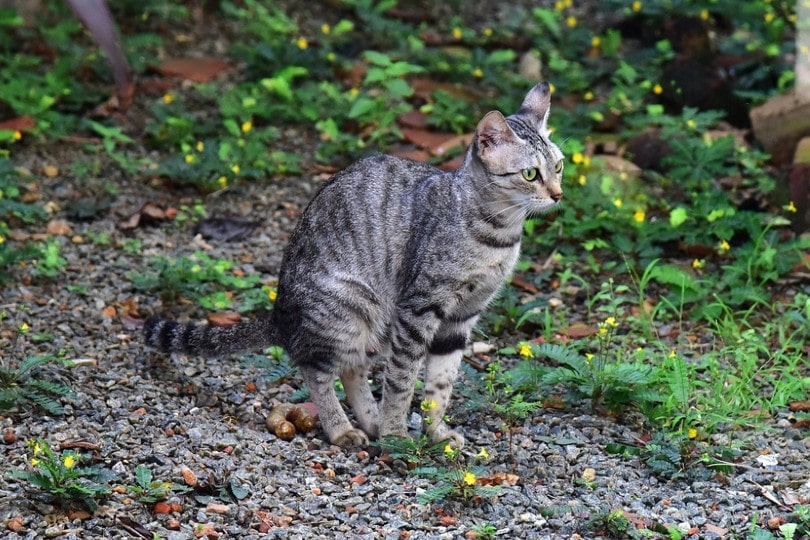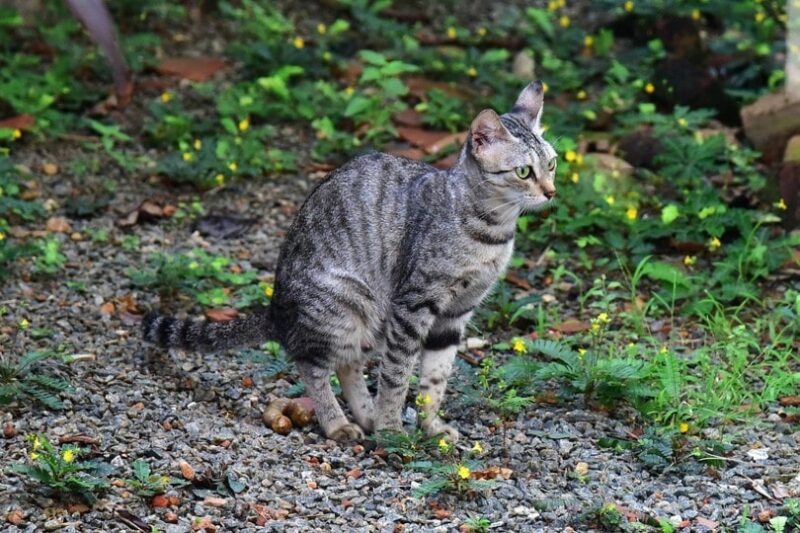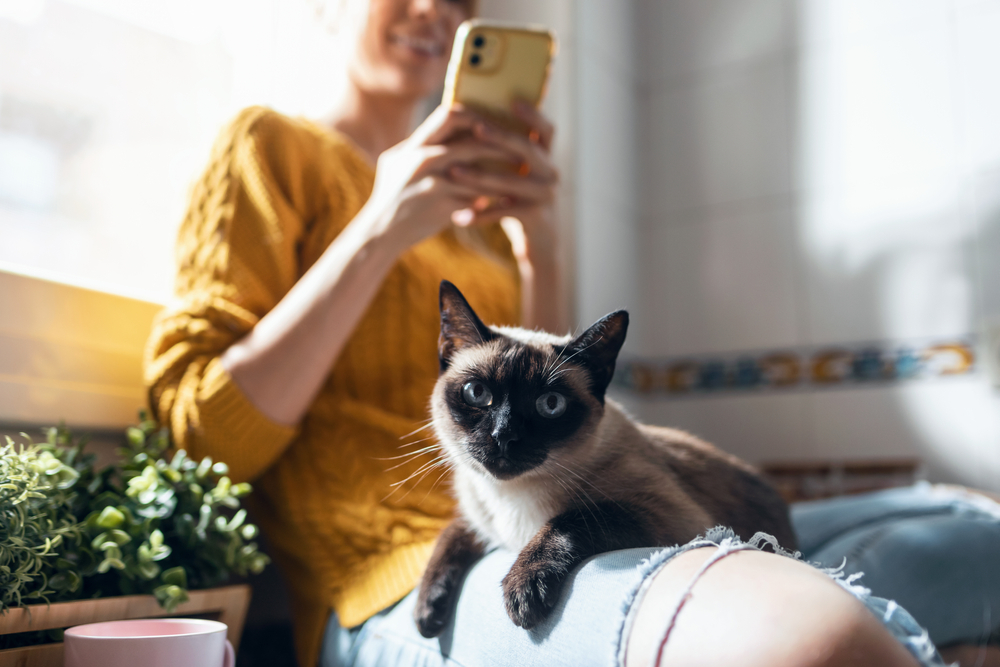A common challenge that many cat owners will inevitably deal with is the smell of kitty droppings. Cat feces have a foul smell, which can easily disrupt the air quality in your home. So, having your cat do their business outside can save you the trouble of cleaning and dealing with the not-so-aromatic fragrance of cat excrement.
While more convenient, you may think that your cat pooping on your plants outside is the better choice, but can cat poop hurt your plants? Yes, cat poop can be harmful to your plants if it is not properly composted or aged.
Are you curious how cat poop can damage your plants? Read on to find out more!
What Makes Cat Poop Dangerous?
Aside from the unpleasant smell, fresh cat excrement is potentially dangerous because it can affect the chemistry of your soil and pose health risks.
Soil Chemistry
Cat poop is essentially similar to cattle poop in the sense that it contains nitrogen, phosphate, and potassium. The elements found in excrement are the primary ingredients in organic fertilizer. The reason why fresh cat feces can harm your plants is the amount of nitrogen present. Cat feces contain nearly twice as much nitrogen as cattle feces, which can burn and damage plants if added to soil.
Aside from the high levels of nitrogen, fresh cat feces may also contain harmful bacteria, pathogens, and parasites that can potentially contaminate and damage your plants.
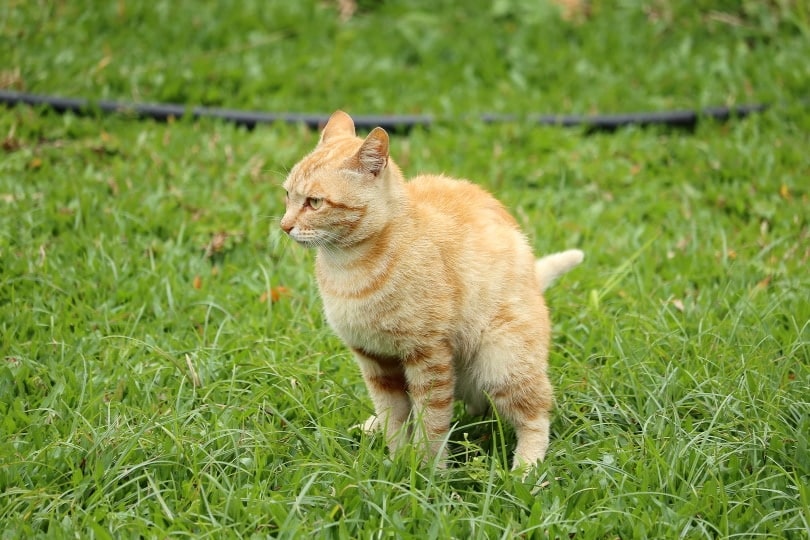
Health Risks
Aside from the potential harm that your cat’s poop can cause to your plants, leaving it in the garden can also pose several health risks. Humans can be at risk of diseases, such as Toxoplasmosis, Salmonella, E. coli, and roundworms, if the excrement is not disposed of properly and left to decompose in the soil.
Toxoplasmosis is caused by the Toxoplasma gondii parasite, which is transmitted through cat feces. While most infected may not experience symptoms, pregnant women pose the highest risk, as toxoplasmosis can cause birth defects.
Another parasite that can be passed to humans through feces is roundworms, which can also cause serious illness. Salmonella and E. coli are two types of bacteria that can be transmitted through cat feces. Both bacteria can cause gastrointestinal infections and fever.
Cleaning Your Cat’s Poop
Because of the potential harm to your plants and your health, it is crucial to clean up your cat’s waste. To prevent contamination, wear thick rubber gloves and a dust mask when cleaning your cat’s feces. With a shovel, remove the poop along with any surrounding soil or produce that has come into contact with it. To ensure that you removed everything, try to dig the soil up to 2 inches deep from where the cat feces rested.
With cat urine, you don’t have to worry about any harmful effects on the soil, plants, or humans unless the urine is in high concentration. However, it is still recommended that you rinse off the urine on plants or the soil with water to remove the smell and prevent any further damage to your plants.
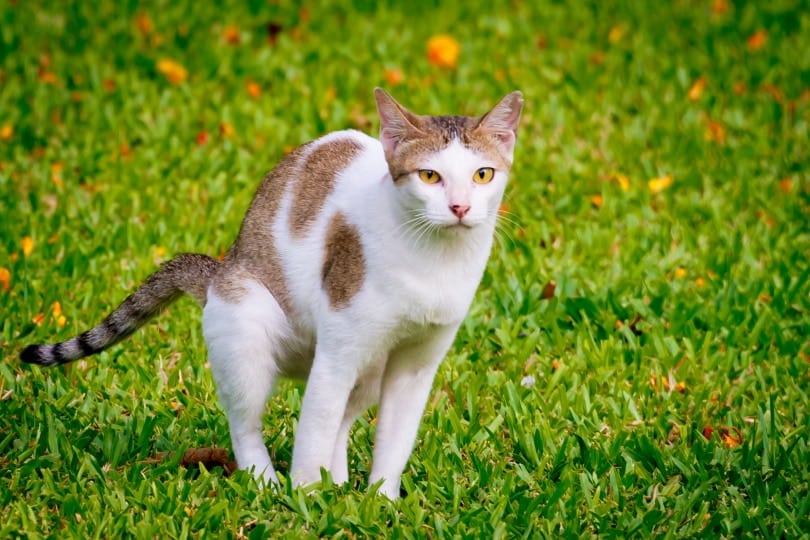
Preventing Your Cat From Pooping on Your Plants
Whether it’s vegetable beds or potted plants, a few tricks are available to keep your cat from using them as litter boxes. Of course, the best way to train your cat to avoid going potty on soil is by training them to use the litter box in the first place. Cats may be curious and love to explore, but they are also creatures of habit. If they develop the habit of using the litter box, they typically won’t do it anywhere else.
If entirely unavoidable, especially in an area with stray cats, you may have to use repellents. Chicken wire can keep cats away from your garden or potted plants by acting as a cage. Another method that utilizes barriers includes using large stones to cover soil. This is preferred for potted plants rather than gardens or vegetable beds because of the number of stones needed to cover the soil. The use of stones makes the surface smooth and hard, which is unattractive compared to the soft texture of soil.
Aside from the barriers, motion-activated devices are convenient for keeping your cat from going near plants and other areas. They produce a noise when motion is detected, which can effectively deter cats from going closer. Using motion-detected water sprinklers in gardens and vegetable beds is also a great way to keep cats from getting too close. Using safe substances with overwhelming scents, such as apple cider vinegar, can repel cats as well.
Cat Poop as Compost and Fertilizer
If you’re wondering if cat poop can be used as fertilizer, you can if it is properly composted. Composting is a natural process that breaks down feces and kills off harmful bacteria and parasites. Composting cat feces and other materials should be done away from organic matter to prevent contamination. To avoid over-fertilization, it’s best to dilute cat poop compost with other types of compost or organic matter.
Before using it as fertilizer, ensure that the compost has fully decomposed. Cat poop compost should only be used on non-edible plants, such as flowers, trees, or shrubs. Compost with cat feces can still pose health risks even though properly decomposed and composted, so it’s best to avoid using it on fruit or vegetable plants.
When removing cat poop, remember to wear gloves and wash your hands to reduce the risk of bacterial or parasitic infections.
Final Thoughts
Your house may smell much better if your cat poops out in the garden, but it can be harmful to plants and humans. Should your cat end up pooping on your plants, be sure to properly clean it with gloves and a shovel to prevent plant damage and health complications.
There are safe ways to keep your cat from going potty around your plants with the use of barriers or repellents, but using litter boxes is still the best and preferred way of dealing with your cat’s waste!
See also:
- My Cat is Suddenly Pooping a Lot: Is it Normal? (Vet Answer)
- Why Do Cats Poop on Grass? 3 Likely Reasons & How to Stop It
Featured Image Credit: AjayTvm, Shutterstock

